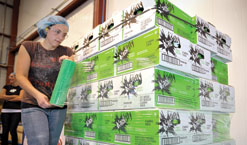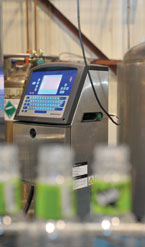
Learning to fly
By Andrew Joseph, Features Editor
Automation Sustainability Black Fly Beverage Company Fabrication Sustainability microdistillery polyethylene terephthalate StretchwrappingOntario’s first microdistillery earns rave reviews for its environmental commitment
Being awarded Ontario’s first microdistillery license in 100 years might be enough for some companies to crow about, but not for Black Fly Beverage Company, of London, Ont., who right from the get-go sought to redefine how a small Canadian distiller can compete against the bigger global competition.
Opening its doors in 2005, the privately-owned Black Fly armed itself with a unique and great-tasting product and an award-winning penchant for greening its busines operations and packaging.
“We wanted to evolve the Ready-To-Drink (RTD) cooler category, and we knew that as a small producer just starting out that we would have to offer more to the consumer on all fronts,” explains Cathy Siskind-Kelly, who along with her husband Rob Kelly founded the business after spotting an opportunity to offer a unique premium spirit beverage to the Canadian market.
She explained to Canadian Packaging magazine during a recent tour of the facility that the distiller took its name from the small but pesky Canadian black fly because, like the determined microbusiness the company positioned itself as, it can come in under the radar to deliver a mighty bite. Moreover, notes Siskind-Kelly, the black fly actually pollinates wild blueberries whose juices are used in two of the distiller’s mixed vodka drinks.
From the beginning, Black Fly sought to produce more than just a simple alcoholic beverage, insisting on premium ingredients such as real juices and no high fructose corn syrup; packaging innovations such as its unique PET (polyethylene terephthalate) wide-mouth bottles and reduced four-pack glueless carriers, consumer convenience via its nonbreakable and resealable PET bottles when nearly all the competition used glass, providing 15 per cent more volume per serving than competing brands, and to do it all at a competitive price.
The company’s current line-up of pre-mixed cocktail products includes: Black Fly Vodka Cranberry Mixed Drink; Black Fly Vodka Blueberry Mixed Drink; Black Fly Vodka Citrus Mixed Drink; Black Fly Tequila Margarita, and; Black Fly Tequila Sunrise, with several new products set to launch next spring.
Originally setting up shop in a nontraditional boutique in downtown London, the instant popularity of the drink inspired the privately-owned distillery to move into a much larger spacious 6,600-square-foot facility in the heart of the city’s industrial sector, conveniently right next door to the Liberty Freezer cold-storage warehousing plant.
Air Time

A plant employee using the OXO-Biodegradable film to secure product to the pallet for safe transportation.
Back when the company was just starting up, Black Fly attracted the attention of the national CBC broadcaster, who followed the company’s start-up on its popular Venture business show.
“This show aired eight times nationally, and truly helped launch our business in terms of assisting us in understanding what resonated and excited consumers across the country,” says Siskind-Kelly. “We learned Canadians love to support local products and want to buy Canadian, and that they were thirsty for a less-sweet, quality-made RTD.”
Mike Pearce, director of sales, says Black Fly was welcomed into the industry by many small and large producers.
“Beer companies—large and small—consider Black Fly to be a non-competitive product.
“In fact, when Black Fly’s not-too-sweet mixed drinks are served at large events alongside beer, beer companies know that sales of all products will go up,” Pearce says.
“When there is something for everyone, people often like to stay out longer, to enjoy beverages in licensed event areas.”
This year, Black Fly has experienced its strongest year of sales to date, growing its total revenues by over 56 per cent in Ontario and 21 per cent nationally.
Black Fly’s early distribution spoke to the enormous challenges it faced as an upstart craft producer, as its distribution through the LCBO (Liquor Control Board of Ontario) was limited to just six stores in the London-area. However, enthusiastic consumer response, a catchy moniker and good retail support gave the microdistiller the wings to do some serious soaring.
Nowadays, Black Fly brands can be found in over 500 LCBO’s in Ontario plus an additional 500 stores from Nova Scotia to British Columbia.
“We’re even in the Yukon,” says Pearce. “They said ‘we have black flies up here, why don’t you bring yours?’”

Black Fly uses a Videojet 1210 small character inkjet printer to apply lot code data to filled bottles of product.
As much as the distiller is keen to innovate in creating unique tasty premium alcoholic beverages, it is equally enthusiastic about innovation in the area of green initiatives, applying eco-friendly packaging options and business practices as part of its everyday functions.
According to Pearce, Black Fly gets its supply of PET-1 bottles—the most recyclable plastic currently used in the industry—from a local Ontario manufacturer.
These plastic bottles weigh a scant 40 grams when empty compared to a similar-sized glass bottle weighing 260 grams,” points out Pearce, who is heavily involved in the greening of Black Fly: “This means the transportation of our products results in less greenhouse gas.”
Noting that Black Fly has a deposit program with retailers to encourage bottle returns, Pearce is also proud of how the reduced packaging design of Black Fly’s four-pack carriers have enabled it to utilize less corrugated, while still maintining sufficient strength to protect the product.
“Our open-sided carriers allow consumers to easily see our products while providing a sturdy customer carrying container while using less corrugated than traditional top-open and closed containers,” says Pearce noting how carriers provided by Rock-Tenn Company (formerly Smurfit MBI) are completely glueless, instead using a specially-designed system of folds and punch-through closures.
Black Fly’s latest green initiative is its biodegradable pallet-wrap film purchased through distributor Canpaco Inc. of Woodbridge, Ont.
“We actually first saw this product in an advertisement in Canadian Packaging magazine offering a free test trial,” recalls Pearce. “Our production manager Mike Nesker mentioned it to me, and it seemed like a very interesting product. We contacted Canpaco, they came and showed it to us, and, we really liked it.”
Manufactured by the Montreal-based Intertape Polymer Group Inc., the OXO-Biodegradable eco-friendly pallet-wrap film greatly reduces the amount of waste plastic entering the landfills.
According to Canpaco, the green-tinted OXO-Biodegradable pallet-wrap film is manufactured with an additive that first initiates and then accelerates the film’s breakdown when exposed directly to sunlight—completely transforming it into carbon dioxide, water and biomass within a year.
“Using the OXO-Biodegradable film has really helped us in our recycling. This film has been a perfect choice for us in reducing our impact at landfills,” mentions Pearce. “We like it so much that we have even got some of our suppliers to switch to using it when they ship materials to us.”
Although Black Fly first began utilizing the biodegradable pallet-wrap film late in 2010, it has only been able to go full bore with it since this past summer, when it was requested by the LCBO to test it fully for strength and durability.

An eco-sensitive combination of OXO-Biodegradable pallet-wrap film, Lock N’ Pop adhesive and CHEP pallets enables Black Fly to assure its customers of a safe product delivery every time.
To enhance that stability, Black Fly uses an organic liquid gum adhesive from Lock N’ Pop, an ITW Company.
“Before we pallet-wrap the OXO-Biodegradable film around a pallet of product and apply a single strap around the top layer per LCBO requirements, we first apply the Lock N’ Pop adhesive to the top of each layer of cartons to help prevent load slippage,” explains Pearce, adding that the load stability is further enhanced by the way the cartons are stacked and layered. “It’s a very stable 670-kilogram load,” he states.
Pearce adds that CHEP, a global leader in pallet and container pooling, supplies its patented high-quality hardwood pallets for Black Fly’s transportation purposes. Pearce says that even if CHEP wasn’t one of the LCBO’s two designated pallet suppliers, they would have chosen them anyway simply because they manufacture top-quality pallets.
Liking what Black Fly was doing, the LCBO honored them with a pair of its prestigious Elsie Awards in the Small Supplier/Agent of the Year category, while also honoring the environmental commitment to its green initiatives with its Environmental Responsibility and Ongoing Green Initiatives award, specifically citing Black Fly’s locally-sourced PET bottles and green OXO-Biodegradable pallet-wrap film.
Other equipment utilized at the Black Fly facility include:
- A new 1210 small character inkjet coder manufactured by Videojet Technologies Inc.
- Carbon-dioxide gas tank supplied by Air Liquide to add carbonation to the beverages.
- a 3M case-sealer for secondary packaging applications.
“Many people who migrated away from the RTD category are very excited when they discover a more natural and less-sweet convenient premium spirit beverage available,” says Siskind-Kelly. “As we continue to grow, we also want to continue to be at the cutting edge of great green choices and be environmentally responsible,” she concludes.
“Reducing our environmental footprint via our package design or PET bottles or our OXO-Biodegradable pallet-wrap will help Black Fly continue to be a driving force in the industry, as we develop and expand our unique spirit beverages throughout Canada and beyond.”
Advertisement

